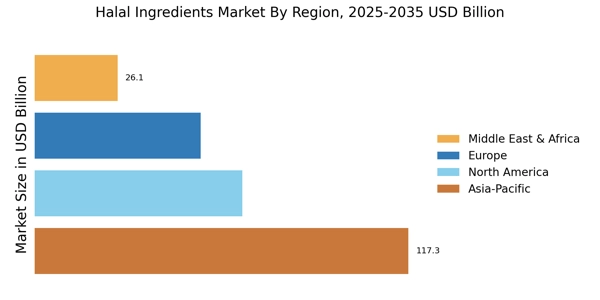Increasing Consumer Awareness
The Halal Ingredients Market is experiencing a notable surge in consumer awareness regarding dietary restrictions and ethical consumption. As more individuals seek transparency in food sourcing, the demand for Halal-certified products has escalated. This trend is particularly pronounced among Muslim consumers, who prioritize Halal compliance in their dietary choices. According to recent data, the Halal food market is projected to reach a value of approximately 2 trillion by 2025, indicating a robust growth trajectory. This heightened awareness is not limited to religious consumers; non-Muslim populations are increasingly recognizing the benefits of Halal ingredients, such as quality assurance and ethical sourcing. Consequently, manufacturers are compelled to adapt their offerings to meet this growing demand, thereby driving the expansion of the Halal Ingredients Market.
Cultural and Demographic Shifts
Cultural and demographic shifts are playing a pivotal role in shaping the Halal Ingredients Market. The increasing Muslim population, particularly in regions such as Southeast Asia and the Middle East, is driving demand for Halal-certified products. Additionally, there is a growing trend among non-Muslim consumers who are becoming more health-conscious and are seeking out Halal options for their perceived quality and safety. This demographic shift is prompting food manufacturers to innovate and create new Halal products that cater to diverse tastes and preferences. As the market adapts to these cultural changes, the Halal Ingredients Market is expected to witness sustained growth, reflecting the evolving landscape of consumer demands.
Growth of E-commerce and Online Retail
The rise of e-commerce and online retail platforms is transforming the Halal Ingredients Market. With the increasing penetration of the internet and mobile technology, consumers are now able to access a wider range of Halal products from the comfort of their homes. This shift is particularly beneficial for consumers in regions where Halal products may not be readily available in local stores. E-commerce platforms are facilitating the distribution of Halal ingredients, allowing manufacturers to reach a global audience. Market analysis indicates that online sales of Halal products are expected to grow significantly, driven by convenience and the ability to compare products easily. As a result, the Halal Ingredients Market is likely to expand rapidly, supported by the growing trend of online shopping.
Regulatory Support and Standardization
The Halal Ingredients Market benefits from increasing regulatory support and standardization efforts across various regions. Governments and regulatory bodies are recognizing the importance of Halal certification in promoting food safety and quality. This has led to the establishment of clear guidelines and standards for Halal products, which in turn fosters consumer confidence. For instance, several countries have implemented policies to streamline the certification process, making it easier for businesses to comply with Halal requirements. This regulatory environment not only encourages local producers to enter the Halal market but also attracts international players seeking to expand their reach. As a result, the Halal Ingredients Market is likely to witness accelerated growth, driven by enhanced credibility and trust among consumers.
Diverse Applications Across Food Segments
The versatility of Halal ingredients across various food segments is a significant driver for the Halal Ingredients Market. These ingredients are not limited to traditional meat products; they are increasingly being utilized in dairy, snacks, and even beverages. This diversification is appealing to a broader consumer base, including those who may not strictly adhere to Halal dietary laws but are drawn to the perceived quality and ethical standards associated with Halal products. Market data suggests that the demand for Halal-certified snacks and ready-to-eat meals is on the rise, reflecting changing consumer preferences. As manufacturers innovate and expand their product lines to include Halal options, the Halal Ingredients Market is poised for substantial growth, catering to a wide array of dietary needs.

















